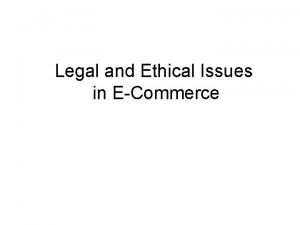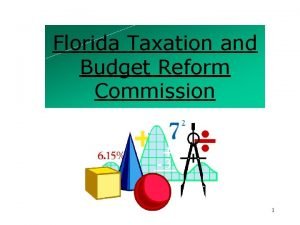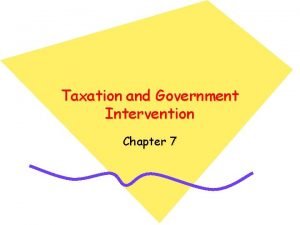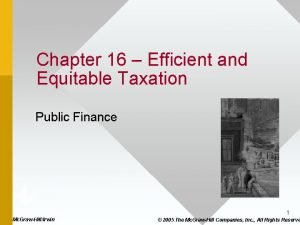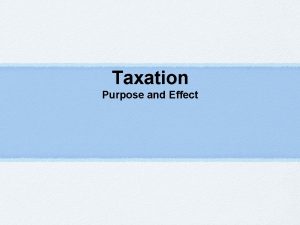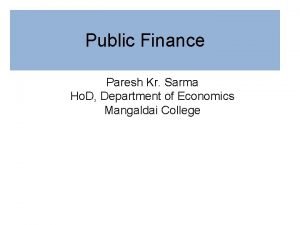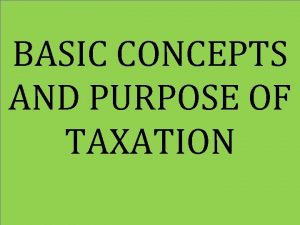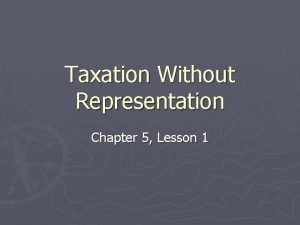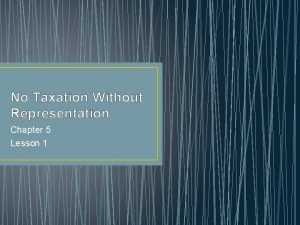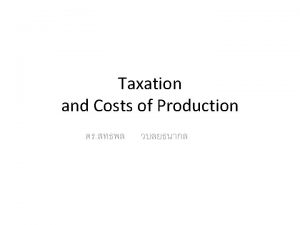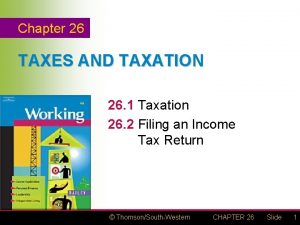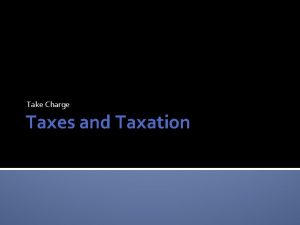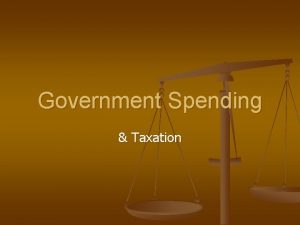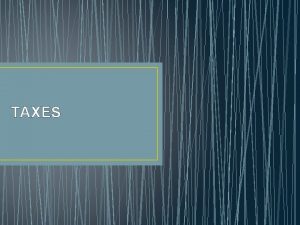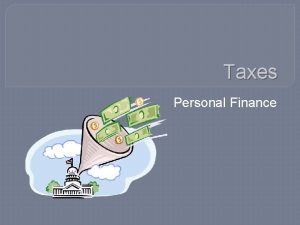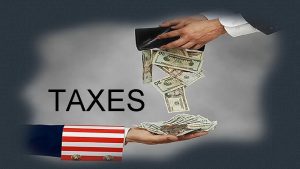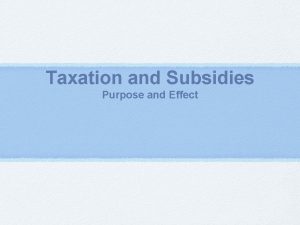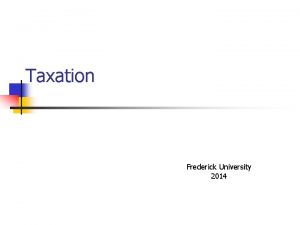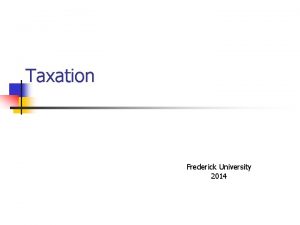Taxes and Taxation What Are Taxes and How

















- Slides: 17

Taxes and Taxation

What Are Taxes and How Should They Be Levied? § A tax is a mandatory payment to a local, state, or federal government. § Taxes are collected and used for various purposes, including § supporting functions of government, § paying for economic infrastructure, and § funding welfare and public services.

What Are Taxes and How Should They Be Levied? § Taxes are also used to promote social and economic goals § Tax to limit the use of things (cigarettes and alcohol) § Redistribute income (higher taxes for the wealthy)

What Are Taxes and How Should They Be Levied? § Despite the many uses for taxes, they have never been popular § Adam Smith's four maxims, or guidelines, of taxation—equity, certainty, convenience, and efficiency—continue to influence thinking about how taxes should be levied.

What Are Taxes and How Should They Be Levied? § Equity-taxes must be fair § Certainty-the time, manner of payment, amount paid, should all be clear to who pays § Convenience-taxpayers should find the process of paying taxes easy § Efficiency- keep the cost of the tax system low

What Are Taxes and How Should They Be Levied? § Economists differ over how to achieve tax equity, the idea that the tax system should be fair. § Some support the ability-to-pay principle, which suggests that citizens should be taxed according to their wealth.

What Are Taxes and How Should They Be Levied? § Others advance the benefits-received principle, which says that those who benefit from a particular government program should pay for it.

What Are Taxes and How Should They Be Levied? § A challenge in devising a fair tax system is determining who bears the burden of a tax, or the tax incidence. § Often times the tax gets passed on the consumer in the form of higher costs for a product (usually for items that are inelastic)

What Are Taxes and How Should They Be Levied? § Taxes sometimes incur costs by distorting the incentives that normally guide people's choices. § When taxes motivate people to be less productive, these taxes result in a deadweight loss, a reduction in productivity or economic well-being.

What Kinds of Taxes Will You Pay in Your Lifetime? § Americans pay many types of taxes. § The tax base is what is taxed, such as personal income, a good sold at a store, or a piece of property. § The tax rate refers to the percentage of income, or the value of a good, service, or asset, that is paid in tax.

What Kinds of Taxes Will You Pay in Your Lifetime? § Taxes are also defined by their structure. § A proportional tax takes the same share of income at all income levels. § Pro: everyone pays an equal share § Con: the poor have less ability to pay than the rich

What Kinds of Taxes Will You Pay in Your Lifetime? § A progressive tax takes a larger share of income as income increases. § Pro-seen as economic equity § Con-seen as punishing rich for being rich § A regressive tax takes a smaller share of income as income increases. § Pro-High earners pay more as they consume more § Con- Greatest burden is placed on those least able to pay

What Kinds of Taxes Will You Pay in Your Lifetime? § Among the main types of taxes are § income taxes (progressive), § payroll taxes (regressive), § property taxes (proportional), § sales taxes (regressive), § corporate income taxes (progressive), § excise taxes (regressive), and § user fees and tolls (proportional).

How Do U. S. Governments Spend the Revenue They Raise? § The federal government gets most of its revenue from taxes. § 1 st- individual income tax § 2 nd- payroll tax § 3 rd- corporate income tax § 4 th- excise tax § Government doesn’t take in as much as it spends, which gives rise to federal deficit § Make up the difference between the two by borrowing

How Do U. S. Governments Spend the Revenue They Raise? § Each year, the federal government draws up a budget to determine how it will spend its revenue. § Budget year runs from October 1 -September 30 § Mandatory spending is fixed by law and includes entitlement programs like Social Security and Medicare. § Discretionary spending may be raised and lowered as Congress sees fit, as in cases such as national defense.

How Do U. S. Governments Spend the Revenue They Raise? § State and local governments also get most of their revenue from taxes. § They spend their revenue on various services, including § education, § public safety, and § social welfare.

How Do U. S. Governments Spend the Revenue They Raise? § https: //www. youtube. com/watch? v=QPK KQnijns. M&feature=youtu. be
 Insidan region jh
Insidan region jh Ethical and legal issues in e-business
Ethical and legal issues in e-business Taxation and budget reform commission
Taxation and budget reform commission Producer surplus tax
Producer surplus tax Efficient and equitable taxation
Efficient and equitable taxation Canons of taxation
Canons of taxation Direct and indirect tax difference
Direct and indirect tax difference Canons of taxation
Canons of taxation Classification of tax
Classification of tax Effect of taxation
Effect of taxation Taxation definition
Taxation definition Lesson 1 no taxation without representation
Lesson 1 no taxation without representation Nevada department of taxation
Nevada department of taxation Business taxation syllabus
Business taxation syllabus Lesson 1 no taxation without representation
Lesson 1 no taxation without representation Liberty brotherhood equality
Liberty brotherhood equality Daughters of liberty
Daughters of liberty Emerging issues in taxation
Emerging issues in taxation

